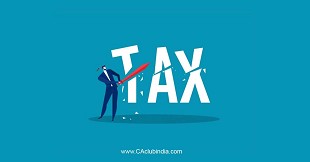Articles by Taxblock
What is PAN and TAN?
Taxblock 26 October 2021 at 09:36PAN is a single number that is an electronic system and has all the tax related information of a taxpayer. TAN is a 10 digit alpha numeric number allotted to persons who are responsible for TCS and TDS.
Various Offences Under Income Tax And Penalty Applicable To It
Taxblock 26 October 2021 at 09:36Default in complying with provisions of or with conditions prescribed under the Income-tax Act would attract certain penalty and in critical cases prosecutions as well.
Section 64 - Clubbing of Income under the Income Tax Act
Taxblock 22 October 2021 at 09:42Clubbing of Income as the term suggests, means adding the income of another person to the income of the person who is paying the tax. This term is explained under Section 64 of the Income Tax Act.
Income from other sources
Taxblock 21 October 2021 at 09:43Incomes that do not fall under any of the other heads will fall under the head of 'Income from Other Sources'. A taxpayer who receives Income from Other Sources is eligible to deduct expenses.
Income from House Property
Taxblock 21 October 2021 at 09:43A house property could be your home, an office, a shop, a building or some land attached to the building like a parking lot. All of these are taxed under the head ‘Income from House Property’ in an ITR.
Income from Capital Gains
Taxblock 20 October 2021 at 09:54Any profit which is earned by transferring a capital asset will be known as capital gains, and it will be taxable under the head Income from Capital Gains if the transfer was made in the previous year.
Deductions under Income Tax
Taxblock 20 October 2021 at 09:54Deductions are typically expenses that the taxpayer incurs during the year that can be applied against or subtracted from their gross income to figure out how much tax is owed.
Income from Salary | An analysis
Taxblock 19 October 2021 at 09:48Income from salary is the remuneration that is received by an individual who is rendering services under any contract which is taken by him. The contract should be under employment.
Rebate and Reliefs under income tax
Taxblock 19 October 2021 at 09:48Rebate under section 87A of the Income Tax Act is a provision that helps taxpayers to reduce their tax liability. This section is available to people whose income do not exceed Rs. 5 Lakhs.
Who Needs A GST Registration & Mandatory Documents For Online GST Registration
Taxblock 15 October 2021 at 09:55Any person who is engaged in inter or intra state supply of goods or services and whose aggregate annual turnover is more than Rs 20 Lakh is binding to obtain a GST registration.
Popular Articles
- Income Tax Return Filing Due Date For AY 26-27: Full Details With New Updates
- TDS Rate Chart For Tax Year 2026-27: With Revised Section Codes in Challans
- Revised Return Due Date Extension
- Tax Deduction Rules for Employee Contributions From April 2026
- Simplified GST Changes in Budget 2026: Finance Bill 2026 CGST and IGST Amendments
- ICAI, ICSI & ICMAI to Launch Short-Term Courses to Develop 'Corporate Mitras' in Tier-II & III Towns
- Income Tax Amendments in Budget 2026: Topic-wise Summary of Key Proposals
- 26 Important Income Tax Proposals in Union Budget 2026
Trending Online Classes
-
DT & Audit (Exam Oriented Fastrack Batch) - For May 26 Exams and onwards Full English
 CA Bhanwar Borana & CA Shubham Keswani
CA Bhanwar Borana & CA Shubham Keswani -
IDT LIVE Exam Oriented Batch | May 2026, Sept 2026 & Jan 2027
 CA Arpita Tulsyan
CA Arpita Tulsyan















 CAclubindia
CAclubindia
